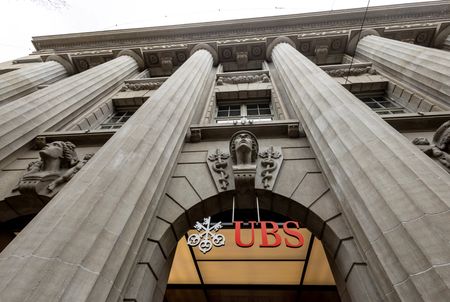By Alun John and Dhara Ranasinghe
LONDON (Reuters) -UK markets were whipped around on Friday, with sterling, government bonds and stocks suffering steep losses, on fresh speculation around the UK government’s highly-anticipated November 26 budget.
Finance minister Rachel Reeves has scrapped plans to raise income tax rates in this month’s budget, the Financial Times said, seeking to avoid a political backlash but alarming investors who pushed up government borrowing costs.
The knee-jerk reaction from investors was negative, with bond yields briefly jumping more than 10 basis points at one point and sterling falling nearly 0.5% against the dollar.
While those moves were tempered as London trading got underway, UK markets remained on the back foot in a sign of investor angst.
Britain’s 10-year government bond, or gilt, yield was last up 7 bps to 4.50%, set for its biggest one-day jump since September and underperforming U.S. and German peers. Bond yields move inversely to prices.
Sterling was last down almost a quarter of a percent at around $1.316 but off session lows, while the euro briefly rose to its strongest levels against the pound since April 2023 at around 88.64 pence.
“Clearly, the market had been hoping the government would take steps to deal with its fiscal shortfall and that would mean a rise in income tax,” said Jeremy Stretch, head of G10 FX Strategy at CIBC Markets.
“Now if the FT report is correct, then that confidence in its attempts to improve the fiscal position is going to be shaken,” he added. “So, what we’re seeing is a lack of confidence from markets and especially the bond markets.”
British government bonds, until Friday, had been outperforming peers helped both by traders’ bets that weak economic data and cooler inflation would help the Bank of England cut rates more quickly, and what they had thought was Reeves’ plans to raise income tax.
Ten-year yields are still down around 20 basis points from the start of September, but up over 10 bps from their mid-October lows.
“The market was feeling pretty smug that the bond market had sort of won, that she (Reeves) was so frightened of upsetting the gilt market and creating another ‘Liz Truss moment’ that she would hike taxes, and they liked the cleanness of that proposal,” said Jane Foley, head of FX strategy at Rabobank. Truss, a former prime minister, left office after just 45 days in 2022 when bond markets responded poorly to her budget plans.
Foley said Reeves had other options such as property taxes, or moves on pensions, but “these are not as clean, and may have bigger secondary implications, may alienate the business community, and the market is also concerned she may lean towards more gilt supply.”
BUDGET MAYHEM
Reeves is expected to need to raise tens of billions of pounds to stay on track for her fiscal targets, and her recent comment that “we will all have to contribute” was seen as paving the way for the government to break its main election pledge and hike income tax rates.
The FT report comes as Starmer’s authority within his own ruling party comes under increasing strain.
Britain’s blue-chip FTSE index shed over 1%, with bank stocks such as Barclays Lloyds and Natwest <NWG.L> falling over 2.5% each.
Traders said if Reeves did not raise income tax, higher taxes on banks may be needed to fill a fiscal hole.
It is typical for higher bond yields to send a country’s currency higher. But on several occasions this year, worries about Britain’s fiscal position have seen government bonds and sterling sell off together.
“It’s got to be the most telegraphed budget ever,” said Mark Ellis, CIO of Nutshell Asset Management, which has increased its exposure to UK stocks this year because it sees relative value.
(Reporting by Alun John, additional reporting by Rae Wee in Singapore and Iain Withers in LondonEditing by Peter Graff)










